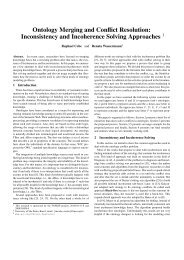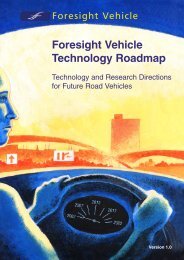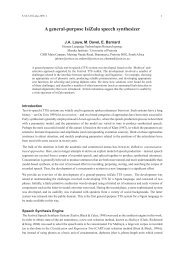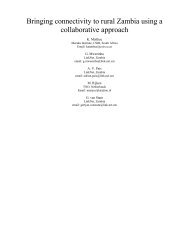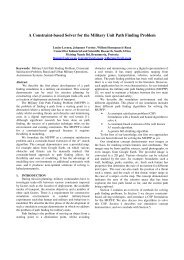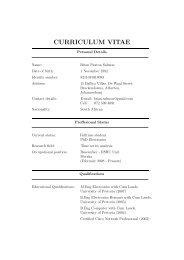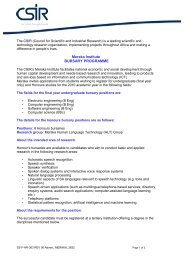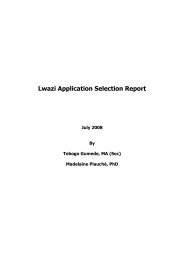Initial fieldwork for LWAZI: A telephone-based ... - Meraka Institute
Initial fieldwork for LWAZI: A telephone-based ... - Meraka Institute
Initial fieldwork for LWAZI: A telephone-based ... - Meraka Institute
You also want an ePaper? Increase the reach of your titles
YUMPU automatically turns print PDFs into web optimized ePapers that Google loves.
there is no single lingua franca <strong>for</strong> South<br />
Africans (see Figure 1). In fact, less than half of<br />
South Africans understand English, the language<br />
in which most government messages are<br />
currently disseminated (Heugh 2007:PANSALB<br />
2001).<br />
35<br />
30<br />
25<br />
20<br />
15<br />
10<br />
5<br />
0<br />
Language proficiency in relation to age<br />
Afrikaans English Xhosa Zulu<br />
Language<br />
Figure 1: Language proficiency of South Africans.<br />
16-17 years<br />
18-24 years<br />
25-34 years<br />
35-44 years<br />
45-54 years<br />
55 + years<br />
Heugh (2007) also reports that between 35% and<br />
45% of South Africans above the age of 16<br />
cannot read or write. Illiteracy is<br />
disproportionately high <strong>for</strong> women and <strong>for</strong><br />
people living in the primarily rural provinces:<br />
KwaZulu-Natal, Limpopo and Mpumalanga.<br />
Mobile phone use is widespread in these areas<br />
among semi-literate citizens and speakers of all<br />
languages.<br />
Communities in rural areas struggle to<br />
access government services due to their remote<br />
locations. Most community members must travel<br />
long distances by foot or rare and costly public<br />
transport to access basic services. In their<br />
longitudinal household study on the costs and<br />
strategies of coping with chronic illnesses<br />
Goudge et al. (2007), <strong>for</strong> example, found that<br />
people in rural areas of South Africa do not go to<br />
free health care facilities because they cannot<br />
af<strong>for</strong>d transport.<br />
NGOs face the same challenge when<br />
trying to reach rural populations. Many produce<br />
in<strong>for</strong>mation to assist households affected by<br />
HIV/AIDS, <strong>for</strong> example, but most of the<br />
materials are published on websites; the cost of<br />
providing multilingual print materials is often<br />
too high. Due to low literacy levels, language,<br />
and a lack of infrastructure, the in<strong>for</strong>mation<br />
remains inaccessible to the people who need it,<br />
especially those living in rural areas and<br />
townships (Benjamin, 2007).<br />
Given the well developed mobile phone<br />
network and the relatively sparse alternative<br />
options in rural South Africa, the authors believe<br />
that multilingual spoken dialog systems can<br />
provide a low-cost solution to improving the ICT<br />
access of citizens who may currently be<br />
excluded from government services due to<br />
language, literacy and location. However, it is<br />
imperative to understand the target users and<br />
their environmental context as a first step to<br />
designing such a system (Nielsen, 1993). In this<br />
paper, we provide background on the current<br />
state of rural government service delivery in<br />
South Africa and introduce the <strong>LWAZI</strong> project,<br />
we describe our field methods, and finally, we<br />
present our findings from the initial field work<br />
with design implications <strong>for</strong> the <strong>LWAZI</strong> system.<br />
2. Background<br />
In South Africa, rural citizens are faced with a<br />
lack of economic activities and limited access to<br />
resources. These include access to basic services<br />
such as health care, legal advice, water,<br />
sanitation and in<strong>for</strong>mation. The government of<br />
South Africa is aware of these problems and<br />
offers many services to stimulate social and<br />
economic growth throughout the country. For<br />
example, citizens are eligible <strong>for</strong> free health care<br />
at certain clinics, free education <strong>for</strong> children and<br />
adults, free job training, foster grants, and<br />
financial aid <strong>for</strong> veterans, students, children, the<br />
disabled, and the elderly. However, rural citizens<br />
participate less in the services due to the long<br />
distances they are required to travel and in many<br />
cases, their lack of knowledge about the<br />
existence of such services. The South African<br />
government is aware of the need to improve<br />
citizen access to services, as well as the specific<br />
challenges that rural communities face. In this<br />
section, we describe the particular ICT project<br />
known as <strong>LWAZI</strong> (section 2.1) which is a<br />
system designed to add to government’s<br />
accessibility by eligible citizens.<br />
2.1 Project Lwazi<br />
2




